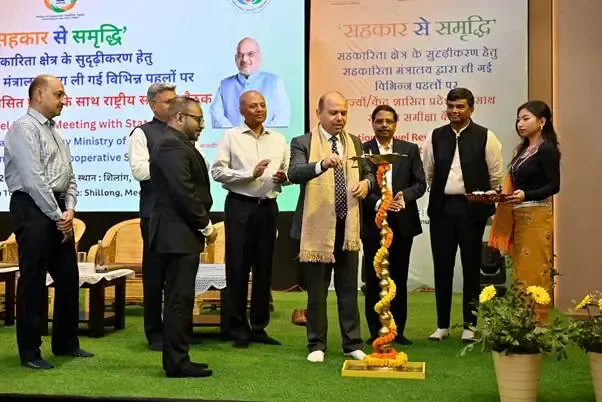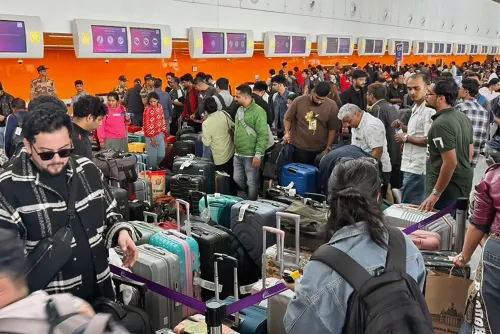Accurate Representation of Cooperative Sector in GDP Needed: Official

Synopsis
Key Takeaways
- Need for PAN number collection for better GDP representation.
- Focus on White Revolution 2.0 for rural upliftment.
- Collaboration with Amul and NDDB for dairy infrastructure.
- Tribhuvan Sahkari University aims to standardize cooperative education.
- Tree planting initiative promotes sustainability.
New Delhi, April 11 (NationPress) Cooperation Secretary Ashish Kumar Bhutani emphasized the necessity of gathering the PAN numbers of all cooperative societies across the nation to ensure a more precise representation of the cooperative sector in GDP, as stated by an official on Friday.
During the opening session of the two-day National Level Review Meeting held in Shillong, Meghalaya, on Thursday, Bhutani initiated discussions on plans and strategies aimed at further enhancing and modernizing the cooperative sector throughout the country.
Reaffirming the government's steadfast dedication to fortifying and promoting the cooperative ecosystem, Bhutani mentioned that under the leadership of Prime Minister Narendra Modi and the guidance of Union Home Minister and Minister of Cooperation Amit Shah, the Ministry is focused on fostering cooperative-led economic development with strong inter-state collaboration to achieve the vision of “Sahakar Se Samriddhi”.
The Secretary highlighted that White Revolution 2.0 stands as one of the key initiatives aimed at uplifting rural communities through the dairy sector.
He noted that the dairy sector showcases excellent examples of how it can empower women and enhance child nutrition.
According to Bhutani, the Ministry is collaborating with organizations like Amul and the National Dairy Development Board (NDDB) to assist states such as Assam, Jharkhand, Uttar Pradesh, and others in improving dairy infrastructure.
He remarked that the economic potential of animal husbandry now surpasses that of conventional crop farming.
He also mentioned that the passage of the bill to create India’s first Tribhuvan Sahkari University is a landmark achievement. “This university will standardize cooperative education across states and elevate over 250 existing cooperative institutions,” he stated.
Bhutani, along with the Chief Secretary of the government of Meghalaya and senior officials, participated in a tree-planting initiative called “Ek Ped Maa Ke Naam” during the International Year of Cooperatives.
The meeting convened essential stakeholders, including representatives from states and Union Territories, officials from cooperative federations, financial institutions, and policymakers, creating a collaborative environment for knowledge sharing and strategic alignment.
The States Review Session highlighted the crucial role of national-level cooperative institutions in bolstering the cooperative ecosystem and promoting innovation and inclusivity.
The Director of the Institute of Rural Management Anand (IRMA), Gujarat, outlined the vision, strategic objectives, and proposed structure for Tribhuvan Sahkari University.










